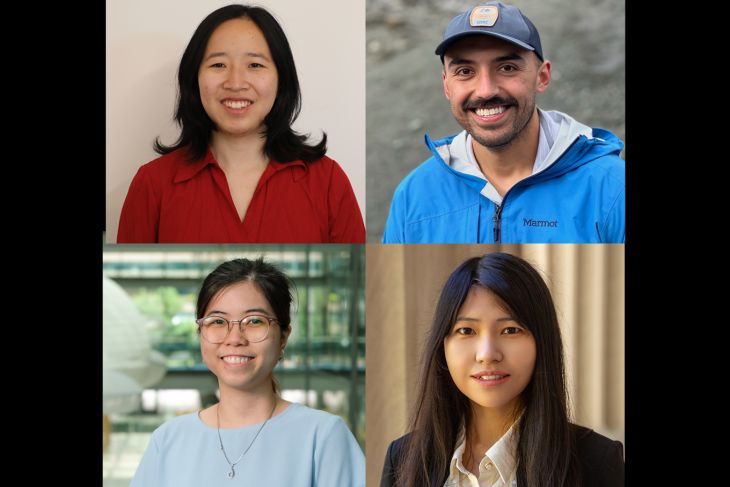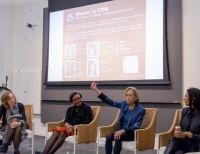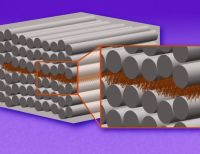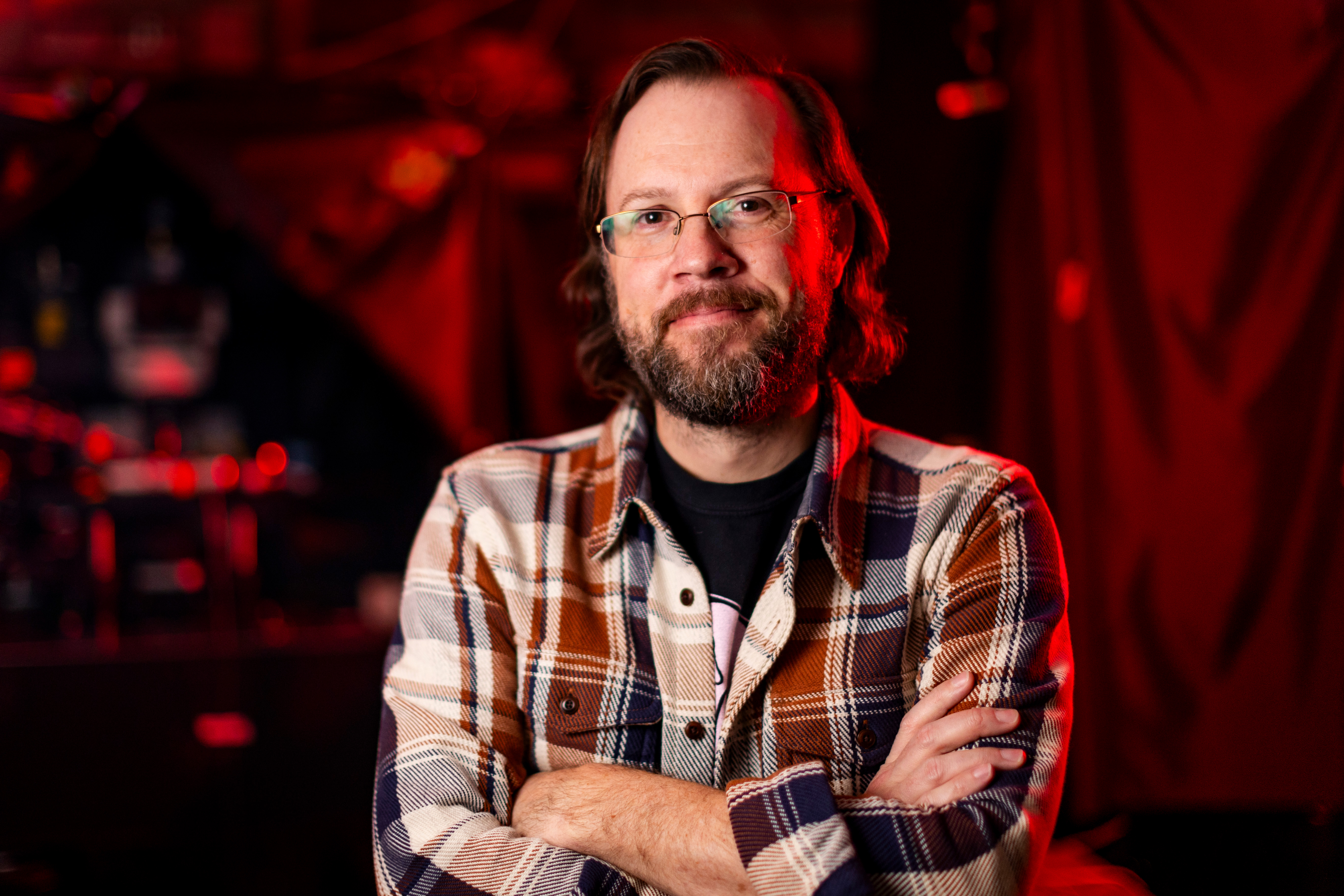Four researchers with ties to MIT have been named Schmidt Science Fellows this year. Lillian Chin ’17, SM ’19; Neil Dalvie PD ’22, PhD ’22; Suong Nguyen, and Yirui Zhang SM ’19, PhD ’23 are among the 32 exceptional early-career scientists worldwide chosen to receive the prestigious fellowships.
“History provides powerful examples of what happens when scientists are given the freedom to ask big questions which can achieve real breakthroughs across disciplines,” says Wendy Schmidt, co-founder of Schmidt Futures and president of the Schmidt Family Foundation. “Schmidt Science Fellows are tackling climate destruction, discovering new drugs against disease, developing novel materials, using machine learning to understand the drivers of human health, and much more. This new cohort will add to this legacy in applying scientific discovery to improve human health and opportunity, and preserve and restore essential planetary systems.”
Schmidt Futures is a philanthropic initiative that brings talented people together in networks to prove out their ideas and solve hard problems in science and society. Schmidt Science Fellows receive a stipend of $100,000 a year for up to two years of postdoctoral research in a discipline different from their PhD at a world-leading lab anywhere across the globe.
Lillian Chin ’17, SM ’19 is currently pursuing her PhD in the Department of Electrical Engineering and Computer Science. Her research focuses on creating new materials for robots. By designing the geometry of a material, Chin creates new “meta-materials” that have different properties from the original. Using this technique, she has created robot balls that dramatically expand in volume and soft grippers that can work in dangerous environments. All of these robots are built out of a single material, letting the researchers 3D print them with extra internal features like channels. These channels help to measure the deformation of metamaterials, enabling Chin and her collaborators to create robots that are strong, can move, and sense their own shape, like muscles do.
“I feel very honored to have been chosen for this fellowship,” says Chin. “I feel like I proposed a very risky pivot, since my background is only in engineering, with very limited exposure to neuroscience. I'm very excited to be given the opportunity to learn best practices for interacting with patients and be able to translate my knowledge from robotics to biology.”
With the Schmidt Fellowship, Chin plans to pursue new frontiers for custom materials with internal sensors, which can measure force and deformation and can be placed anywhere within the material. “I want to use these materials to make tools for clinicians and neuroscientists to better understand how humans touch and grasp objects around them,” says Chin. “I’m especially interested in seeing how my materials could help in diagnosis motor-related diseases or improve rehab outcomes by providing the patient with feedback. This will help me create robots that have a better sense of touch and learn how to move objects around like humans do.”
Neil Dalvie PD ’22, PhD ’22 is a graduate of the Department of Chemical Engineering, where he worked with Professor J. Christopher Love on manufacturing of therapeutic proteins. Dalvie developed molecular biology techniques for manufacturing high-quality proteins in yeast, which enables rapid testing of new products and low-cost manufacturing and large scales. During the pandemic, he led a team that applied these learnings to develop a Covid-19 vaccine that was deployed in multiple low-income countries. After graduating, Dalvie wanted to apply the precision biological engineering that is routinely deployed in medicinal manufacturing to other large-scale bioprocesses.
“It's rare for scientists to cross large technical gaps after so many years of specific training to get a PhD — you get comfy being an expert in your field,” says Dalvie. “I was definitely intimidated by the giant leap from vaccine manufacturing to the natural rock cycle. The fellowship has allowed me to dive into the new field by removing immediate pressure to publish or find my next job. I am excited for what commonalities we will find between biomanufacturing and biogeochemistry.”
As a Schmidt Science Fellow, Dalvie will work with Professor Pamela Silver at Harvard Medical School on engineering microorganisms for enhanced rock weathering and carbon sequestration to combat climate change. They are applying modern molecular biology to enhance natural biogeochemical processes at gigaton scales.
Suong (Su) Nguyen, a postdoctoral researcher in Professor Jeremiah Johnson’s lab in the Department of Chemistry, earned her PhD from Princeton University, where she developed light-driven, catalytic methodologies for organic synthesis, biomass valorization, plastic waste recycling, and functionalization of quantum sensing materials.
As a Schmidt Science fellow, Nguyen will pivot from organic chemistry to nanomaterials. Biological systems are able to synthesize macromolecules with precise structure essential for their biological function. Scientists have long dreamed of achieving similar control over synthetic materials, but existing methods are inefficient and limited in scope. Nguyen hopes to develop new strategies to achieve such high level of control over the structure and properties of nanomaterials and explore their potential for use in therapeutic applications.
“I feel extremely honored and grateful to receive the Schmidt Science Fellowship,” says Nguyen. “The fellowship will provide me with a unique opportunity to engage with scientists from a very wide range of research backgrounds. I believe this will significantly shape the research objectives for my future career.”
Yirui Zhang SM ’19, PhD ’22 is a graduate of the Department of Mechanical Engineering. Zhang’s research focuses on electrochemical energy storage and conversion, including lithium-ion batteries and electrocatalysis. She has developed in situ spectroscopy and electrochemical methods to probe the electrode-electrolyte interface, understand the interfacial molecular structures, and unravel the fundamental thermodynamics and kinetics of (electro)chemical reactions in energy storage. Further, she has leveraged the physical chemistry of liquids and tuned the molecular structures at the interface to improve the stability and kinetics of electrochemical reactions.
“I am honored and thrilled to have been named a Schmidt Science Fellow,” says Zhang. “The fellowship will not only provide me with the unique opportunity to broaden my scientific perspectives and pursue pivoting research, but also create a lifelong network for us to collaborate across diverse fields and become scientific and societal thought leaders. I look forward to pushing the boundaries of my research and advancing technologies to tackle global challenges in energy storage and health care with interdisciplinary efforts!”
As a Schmidt Science Fellow, Zhang will work across disciplines and pivot to biosensing. She plans to combine spectroscopy, electrokinetics, and machine learning to develop a fast and cost-effective technique for monitoring and understanding infectious disease. The innovations will benefit next-generation point-of-care medical devices and wastewater-based epidemiology to provide timely diagnosis and help protect humans against deadly infections and antimicrobial resistance.














